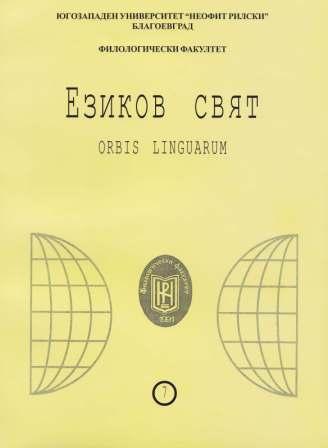ЕТНОФРАЗЕОЛОГИЗМИТЕ В БЪЛГАРСКИЯ ЕЗИК С КОРЕНА ТУРК
ETHNOPHRASEOLOGISMS IN BULGARIAN USING THE ROOT TURK
Author(s): Dimitar Vesselinov, Milena YordanovaSubject(s): Language studies, Language and Literature Studies, Applied Linguistics, Philology
Published by: ЮГОЗАПАДЕН УНИВЕРСИТЕТ »НЕОФИТ РИЛСКИ«
Keywords: Ethnophraseologism; Ethnoimagology; Representation of the Word; Phraseology; Bulgarian language; Turkish language; Ethnolinguistics; Empruntology
Summary/Abstract: The current study is devoted to the Bulgarian ethnic-specific phraseologisms formed by the root turk-. The focus is upon the investigation of the linguistic means used to express the mental picture a nation can have about another one. The topos is the Bulgarian part of the Balkan language scene, while the chronos of the current study encompasses the first two decades of the XXI century. Among the sources of language material excerption are the traditional monolingual dictionaries, phraseological dictionaries, the press, and the actual internet-forum communication. The corpus includes 96 ethno-specific phraseologisms, grouped in 18 semantic fields, which allow us to reconstruct an aspect of the Bulgarian language scene. The Bulgarian linguistic environment is characterized by its dynamism and adequate reflection of the changes that are brought about regionally and globally, which is aided by the role of the mass media. Historically, ethnophraseologisms are primarily connected with the linguistically expressed realia from the time of the Ottoman Empire and the administrative division and the government characteristics of that period. They are limited in number and are usually found in texts regarding our past. The intensive economic, transport, tourist and cultural contacts, the development and the boom of Oriental cuisine not only update and breathe new life to almost forgotten expressions, but also introduce a number of new ethnophraseologisms, which change the lexicological landscape of contemporary Bulgarian and new ways of expressivity and connotation are brought to the fore.
Journal: Езиков свят - Orbis Linguarum
- Issue Year: 2018
- Issue No: 2
- Page Range: 142-147
- Page Count: 6
- Language: Bulgarian

